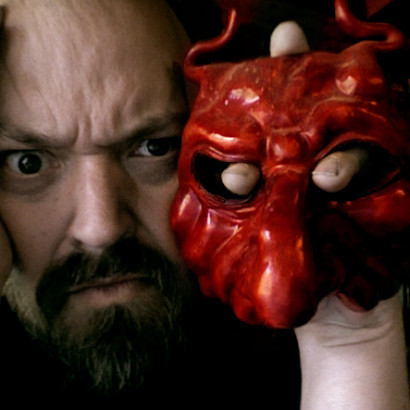 MLF Chapter & Verse
MLF Chapter & Verse
The Manchester Literature Festival Blog
Review: Dave McKean
Festival Blogger Desmond Bullen enjoys an audence with the multitalented visual artist, illustrator and comics legend Dave McKean
If the congregation taking up the pews at the Burgess Foundation are typical of his disciples, Dave McKean attracts a broad church; from the hormonal to the menopausal, from the skateboarder to the rocker, from the dressed up to the dressed down.
They function – rather handily- as a metaphor for the restless mutability of his work, which – from 1987’s Potteresque Violent Cases to as yet half-formed endeavours such as a graphic re-telling of The Cabinet Of Dr. Calagari– has balanced experimentation and appropriation in terms of style with a recognisable identity that is nevertheless wholly his own.
Perhaps this appetite for improvisation and allusion arises from the same part of his psyche that manifests as a love of – and facility for – jazz. Indeed, those who picked their way through the post-Presidential back streets of Manchester in punctual enough fashion would have arrived early enough to hear him give a creditable performance on the Burgess Foundation’s own piano.
McKean himself cuts a solid figure, a twinkle away from avuncular. He is erudite, without the self-satisfaction that might sometimes imply; serious, without taking himself too seriously. So comfortably adult does he appear in his skin that it’s hard to imagine the younger man he must once have been.
In David Gaffney, he has a sympathetic and perceptive interlocutor, a 1970s Parkinson to McKean’s Ustinov or Welles. Indeed, there is something of the latter’s spirit and oft-quoted dictum that “the enemy of art is in the absence of limitations” in his own espousal of the importance of obstructions to the creative process.
As shrewd as Mr. Gaffney’s questions are, those selected from the assortment of his audience are at least their equal. For all their variety of exteriors, what they seem to have in common at centre is an inquisitive intelligence, neatly mirroring McKean’s own. The conversation takes in the role of the fantastic as a lens to explore the dark in the everyday and memory as an act of re-creation.
Although his past achievements – often hand in glove with Neil Gaiman or children’s author, David Almond – are considerable, ranging across medium from comic book page to digital frame, as well as demonstrating his predilection for an artistic polygamy (other accomplices are as diverse as Heston Blumenthal and Richard Dawkins), his greatest enthusiasm is for those works which are still in progress; the afore-alluded Caligaro, and an opera emerging from a play, entitled Wolf’s Child.
The latter, we are told, features a pair of crows as its narrators. The brightest of the corvids offers a final apposite metaphor for its creator, as well as – in its magpie cousins – his enquiring sensibilities; master of all trades, jack of none.
___
Desmond Bullen’s poem, Cheer Up, Wigan’s Rose was performed live by Hacker T. Dog on CBBC. He was recently un-followed by Janet Ellis on Twitter.
Image courtesy Dave McKean
